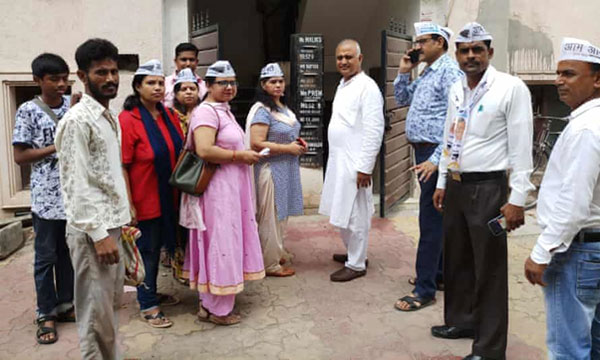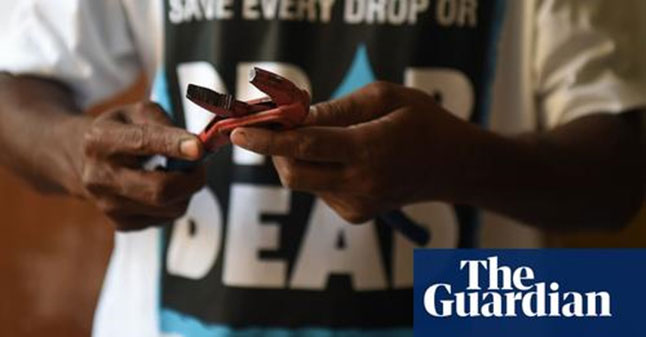Sight of people fighting over water sends plumbers on to India’s streets
With the country’s major cities set to run out of groundwater in 2020, volunteers are helping to conserve precious supplies.
Indian plumber Dibakar Das, who works with water conservationist Aabid Surti, during his rounds in Mumbai. The initiative aims to repair plumbing problems for free. Photograph: Indranil Mukherjee/AFP/Getty
Drenched in perspiration on a muggy Sunday afternoon in New Delhi, Ashia Saifi climbs up and down the stairs of apartment buildings, ringing on doorbells and asking if residents have any leaking taps they want fixed.
Sometimes, the door is slammed shut in her face. People are scared of intruders and strangers, even though Saifi sports a little white cap that’s the emblem of the Aam Aadmi party (Common Man), or AAP, which rules the Indian capital.
But other times, she, and the plumber accompanying her, are invited in, and they check for leaks in bathrooms and kitchens.
Saifi and the plumber, Mohammed Nazim, are part of a water saving campaign launched by AAP leader Somnath Bharti in his constituency of Malviya Nagar. Bharti was inspired by Aabid Surti, a former cartoonist and writer, who offers the same service to homes in Mumbai.
Bharti says it was the sight of “people fighting over water, people crying over water” in slum areas of New Delhi, where residents rely on tankers to deliver water, that galvanised him into action.
“We use WhatsApp to organise our volunteers who go whenever they have time – during weekdays or weekends. It’s serving a dual purpose. The team of volunteers and a plumber fix the leaks but also make people aware of the need to save water if the city is to be spared the dire predictions of experts,” says Bharti.
A report last year by the government-run thinktank NITI Aayog predicted that 21 major cities in India are poised to run out of groundwater in 2020. Anxious to do his bit – and perhaps with an eye on elections to the New Delhi assembly in February 2020 – Bharti launched his campaign last month. New Delhi’s chief minister, Arvind Kejriwal, has said that if the pilot project produces results, it will be replicated across the capital.
Knocking on doors is slow work, and not just because of the brutal humidity. The rules of Indian hospitality dictate that visitors take off their shoes, sit down, partake of refreshments and snacks, and indulge in pleasantries before the job of checking taps can begin.
At a third floor flat, the owner, Neelam Malik, welcomes the group and, after serving Pepsi and crisps, shows Nazim around. It takes him just a few minutes to fix a tap in the bathroom and a washer in the kitchen.

But Malik points through the window to a block of flats where two water tanks on the roof are overflowing. “That is the real problem. You need to go there to tell them to make sure those overhead tanks don’t leak because that is a huge waste,” she says.
In New Delhi, even in the richest homes, piped water from the municipal authorities flows into homes for only a couple of hours a day. Home owners store the water in huge tanks placed on the roof.
Sitting inside their homes, residents have no way of knowing when the rooftop tanks are full. There are devices that will sound an alarm when water starts to overflow, but most residents don’t have one.
Bharti is aware of the problem. “We are talking to the alarm manufacturers to see if they can provide them to us in bulk at subsidised prices so that we can give them to all residents at a low price,” he says.
In a few months’ time, Bharti will check the total amount of water supplied to Malviya Nagar to see if it has reduced as a result of the campaign.
But for Vikrant Tongad, a water conservationist and activist in the city, the AAP has got its priorities wrong. He welcomes Bharti’s campaign but says plugging leaking taps is minor compared with the need to repair and modernise the underground water supply lines, which leak 40% of the city’s total water supply before it gets anywhere near homes.
“The pipes are so old and badly maintained that we [are losing] vast amounts of water,” says Tongad. “I appreciate Bharti’s efforts but the party should focus on fixing the lines.”
Bharti says the AAP government has plans in place. “We are replacing the old supply lines and using new technology that gauges the water pressure in the lines to alert engineers of any leaks,” he says.
In Mumbai, Surti is pleased with the initiative’s progress. “It’s not just Delhi. I am getting groups of concerned citizens all over India telling me that they are following my example in their neighbourhood. Saving water is a global project which all Indians should join.”

